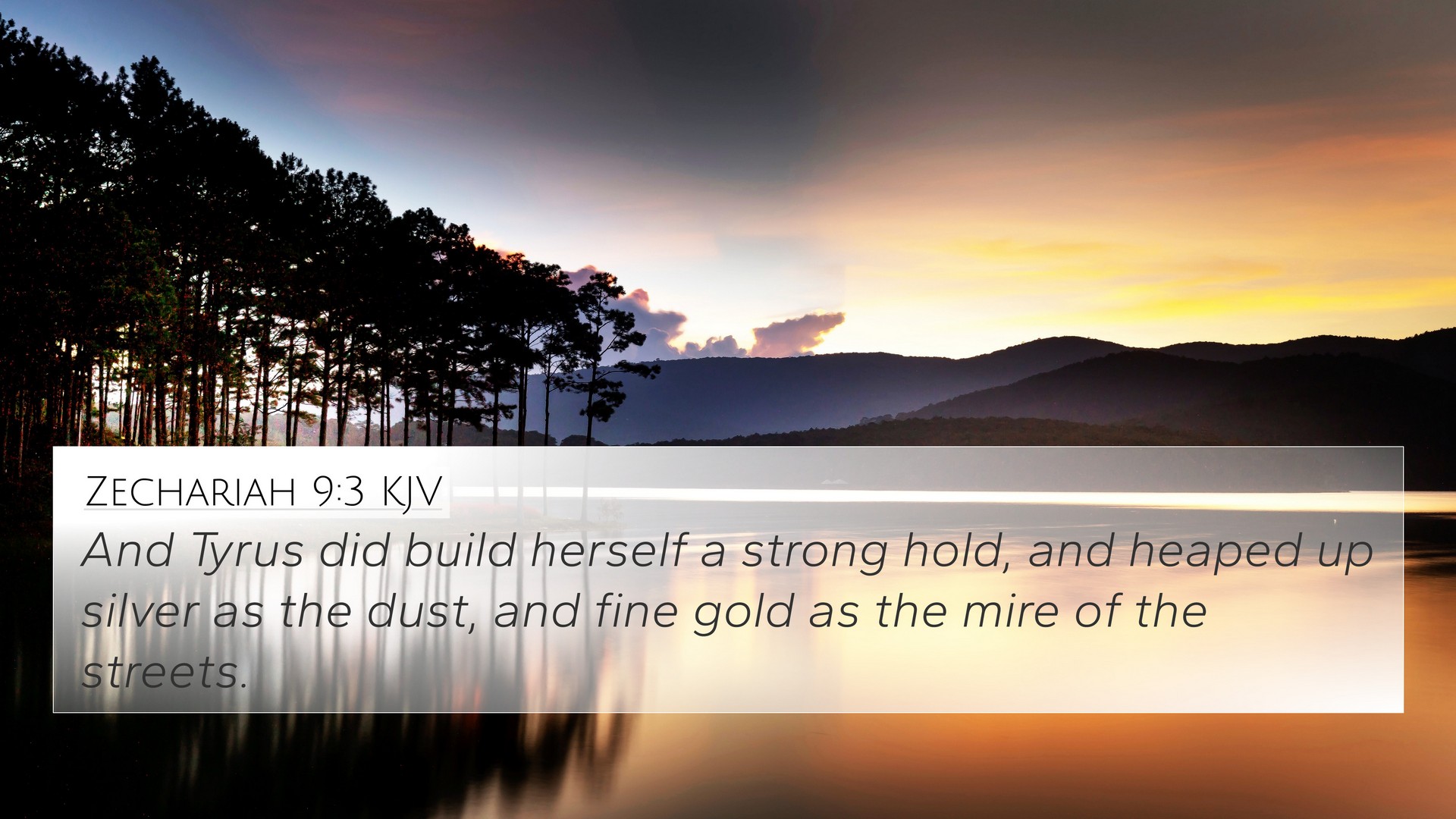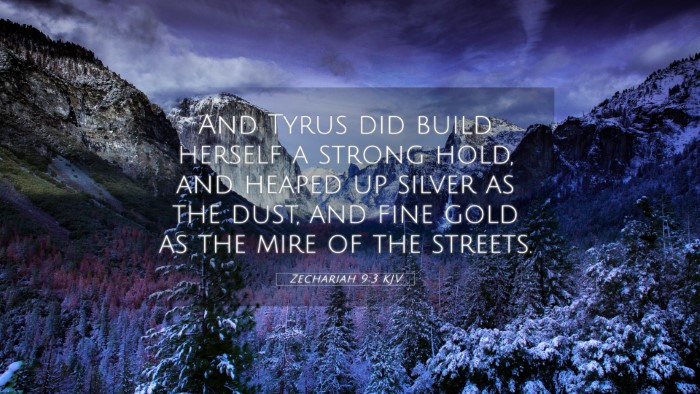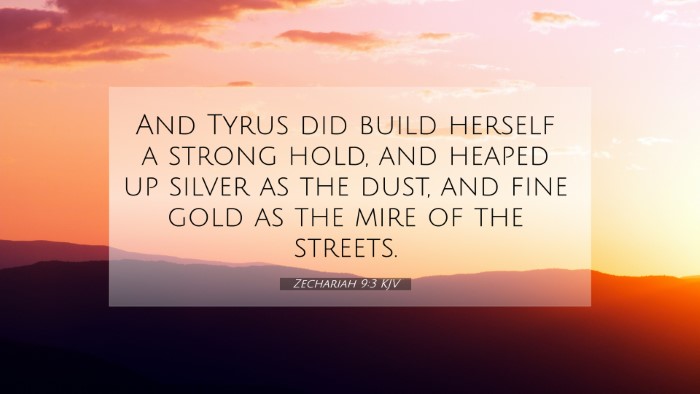Old Testament
Genesis Exodus Leviticus Numbers Deuteronomy Joshua Judges Ruth 1 Samuel 2 Samuel 1 Kings 2 Kings 1 Chronicles 2 Chronicles Ezra Nehemiah Esther Job Psalms Proverbs Ecclesiastes Song of Solomon Isaiah Jeremiah Lamentations Ezekiel Daniel Hosea Joel Amos Obadiah Jonah Micah Nahum Habakkuk Zephaniah Haggai Zechariah MalachiZechariah 9:3 Similar Verses
Zechariah 9:3 Cross References
And Tyrus did build herself a strong hold, and heaped up silver as the dust, and fine gold as the mire of the streets.
Uncover the Rich Themes and Topics of This Bible Verse
Listed below are the Bible themes associated with Zechariah 9:3. We invite you to explore each theme to gain deeper insights into the Scriptures.
Zechariah 9:3 Cross Reference Verses
This section features a detailed cross-reference designed to enrich your understanding of the Scriptures. Below, you will find carefully selected verses that echo the themes and teachings related to Zechariah 9:3 KJV. Click on any image to explore detailed analyses of related Bible verses and uncover deeper theological insights.
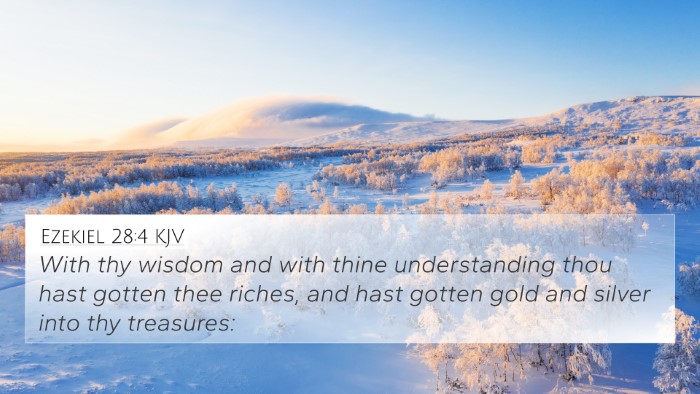
Ezekiel 28:4 (KJV) »
With thy wisdom and with thine understanding thou hast gotten thee riches, and hast gotten gold and silver into thy treasures:

Ezekiel 27:33 (KJV) »
When thy wares went forth out of the seas, thou filledst many people; thou didst enrich the kings of the earth with the multitude of thy riches and of thy merchandise.
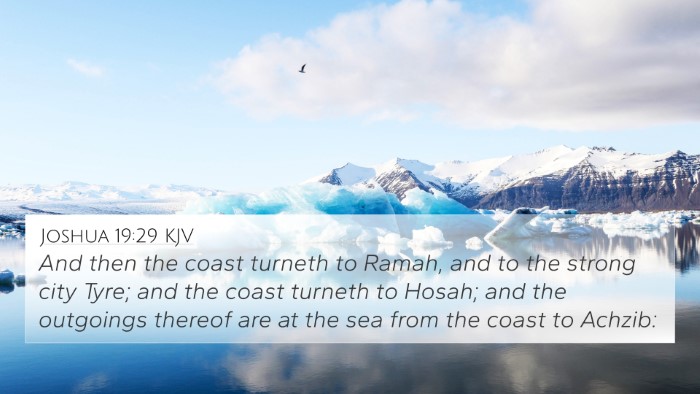
Joshua 19:29 (KJV) »
And then the coast turneth to Ramah, and to the strong city Tyre; and the coast turneth to Hosah; and the outgoings thereof are at the sea from the coast to Achzib:
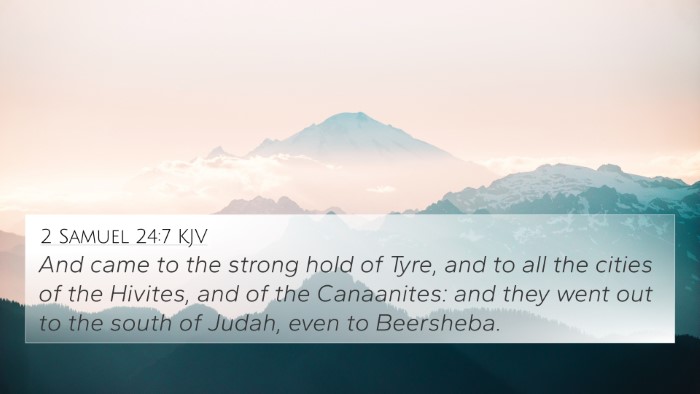
2 Samuel 24:7 (KJV) »
And came to the strong hold of Tyre, and to all the cities of the Hivites, and of the Canaanites: and they went out to the south of Judah, even to Beersheba.
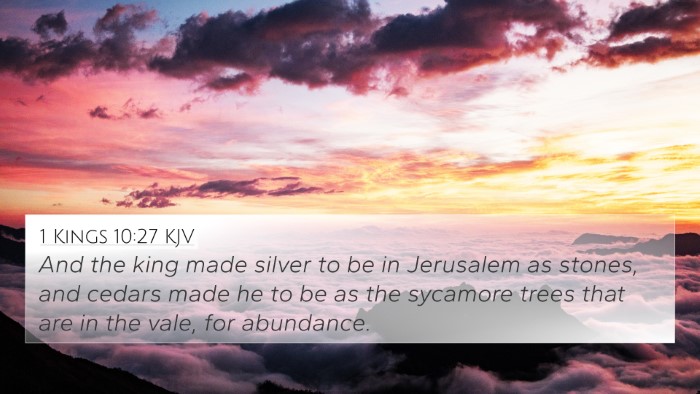
1 Kings 10:27 (KJV) »
And the king made silver to be in Jerusalem as stones, and cedars made he to be as the sycamore trees that are in the vale, for abundance.
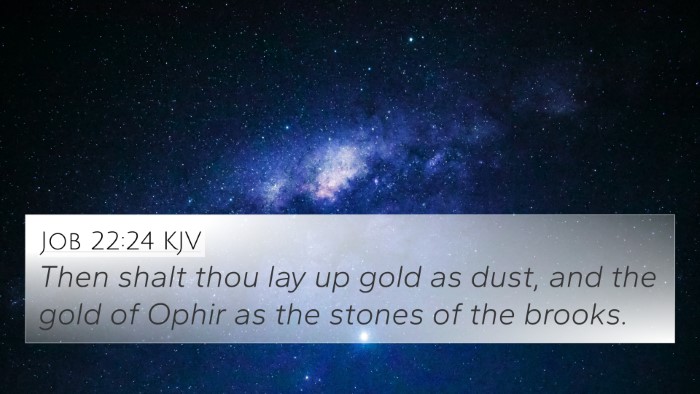
Job 22:24 (KJV) »
Then shalt thou lay up gold as dust, and the gold of Ophir as the stones of the brooks.
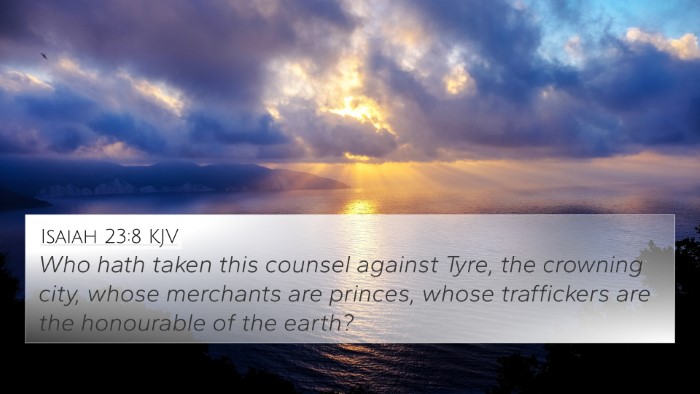
Isaiah 23:8 (KJV) »
Who hath taken this counsel against Tyre, the crowning city, whose merchants are princes, whose traffickers are the honourable of the earth?
Zechariah 9:3 Verse Analysis and Similar Verses
Understanding Zechariah 9:3
Zechariah 9:3 states: "And Tyre did build herself a strong hold, and heaped up silver as the dust, and fine gold as the mire of the streets." This verse depicts the might and wealth of Tyre, a significant city in ancient times known for its commerce and prosperity.
Meaning and Interpretation
This verse conveys several layers of meaning through the imagery of strength and abundance, suggesting a well-fortified city that relies on its material wealth.
- Wealth and Security: The mention of silver and gold emphasizes how Tyre’s affluence provided a semblance of security, reflecting a common belief in the power of wealth.
- Divine Judgment: The surrounding context suggests that this prosperity may invoke God’s judgment, as the opulence of Tyre is linked to national pride and rebellion against God.
- Comparison with Other Nations: Tyre's fortifications symbolize the transient nature of earthly power, contrasting with the eternal sovereignty of God.
Commentary Insights
Matthew Henry
Matthew Henry notes that the verse illustrates Tyre's great wealth and fortified position, understanding it as a metaphor for human pride and the reliance on material possessions, which ultimately cannot save from divine judgment.
Albert Barnes
Albert Barnes emphasizes that Tyre’s riches did not guarantee its stability or survival against divine intervention, drawing attention to the futility of trusting in human strength rather than God.
Adam Clarke
Adam Clarke also highlights the significant commerce of Tyre, detailing how its extensive trade led to great prosperity, yet warns that such wealth can lead nations away from spiritual truths.
Overall, this verse serves to remind readers of the consequences of pride and reliance on financial strength over faith in God.
Cross-Referencing Bible Verses
This verse connects deeply with other scriptures that discuss wealth, pride, and the fate of nations. Below are a few significant cross-references:
- Isaiah 23:1-18: A prophetic judgment against Tyre illustrating its eventual fall.
- Ezekiel 26:1-21: Detailed destruction of Tyre, showcasing the fragility of human endeavors.
- Proverbs 11:4: "Riches do not profit in the day of wrath," highlighting the limits of material wealth.
- Jeremiah 9:23-24: A reminder not to boast in wisdom, might, or riches but to understand and know the Lord.
- Matthew 6:19-21: A teaching of Jesus on laying up treasures in heaven rather than on earth, reinforcing spiritual priorities over materialism.
- Luke 12:15: "Beware of covetousness," warning against the dangers of focusing solely on wealth.
- Revelation 18:17: A lament over the fall of Babylon, comparable in its luxury and eventual downfall to Tyre.
Conclusions
Ultimately, Zechariah 9:3 serves as a profound reminder of the constraints of human pride and material wealth in comparison to the everlasting nature of God's sovereignty. The combination of insights from noted biblical commentators alongside rich cross-references offers a comprehensive understanding of the verse's thematic connections.
Thematic Bible Verse Connections
Exploring the thematic connections among these verses reveals a broader biblical narrative on the relationship between wealth, security, and divine sovereignty. Various tools for Bible cross-referencing can enhance your study, allowing for deeper insights into scripture and its interconnectedness.
Using Bible Cross-References Effectively
Utilizing a bible concordance or a bible cross-reference guide can facilitate a comparative analysis of these scriptures.
- Understand how to connect themes across the Bible.
- Identify connections between the Old and New Testaments.
- Explore links between the Prophets and the Apostolic teachings.
- Conduct comparative studies of the Pauline epistles.
Final Thoughts
Zechariah 9:3, when considered alongside its cross-references and the wisdom of biblical commentators, deepens our understanding of the transient nature of human security and the ultimate sovereignty of God. This verse serves as a powerful reminder to place our trust not in the material wealth of this world, but in the eternal truths found in the divine.
